- Home
- Barbara Metzger
Love, Louisa Page 2
Love, Louisa Read online
Page 2
First she hid in the bride’s anteroom while her mother and sister stood at the inn’s door, hugging and kissing all the head-shaking, tongue-clucking guests good-bye. Then, still in her wedding gown, Louisa made her brother-in-law drive her and the leftover food into the city, to every soup kitchen and food pantry they could find. At least someone would get to enjoy what was supposed to have been the happiest day of her life.
Happy? In all her twenty-seven years, Louisa could not remember being so miserable, so angry and hurt and numb all at the same time. Her father’s death when she was nineteen had left a sad gap in her life, almost as sad as when he’d moved out and away to Oregon when she was twelve, but not quite. That was like living with one damaged kidney. You survived. This, though, was like having your heart squeezed out of your chest by your own pet boa constrictor, then eaten by rabid baboons with purple behinds. No one could live through it. No one should have to. She curled up on her bed when they got back to the inn, in the room where she was to have spent her wedding night. Room, tomb, what was the difference? Womb, with Mama and Bernie across the hall. No groom. Lost her bloom. Doom.
The phone rang. The baboons were playing bongos inside her brain. “Mpf?”
“Good morning, Miss Waldon. You asked for a wake-up call.”
How could she wake up when she’d never gone to sleep? “Hnuh?”
“Have a lovely day.”
Good thing Louisa’s mouth was filled with sawdust or she’d have told that chirpy voice where to go with her lovely day. She did drag herself off the bed, though, and stood under the shower for ten minutes. Then she took off her wedding dress and took a bath.
*
“I am never going to have another drink. Never going to have another wedding. Never going to trust another man. Never—”
“Don’t be ridiculous,” Annie said. “Jeff knows some very nice men at his office. As soon as you’re back from your honey—vacation, we’ll have a barbeque at our place.”
Hot dogs, hamburgers, baked beans, insurance salesmen. Louisa’s stomach churned. Annie’d insisted on driving Louisa to the airport, rather than have her spend the money on a limousine. The children were, thankfully, home with Jeff. Louisa kept her eyes closed as Annie navigated the LIE and the Belt Parkway, over potholes and construction plates.
“You’ll be fine,” her sister was saying, reaching over to pat her shoulder, crossing into the lane of an oncoming Army transport Jeep.
“—Never going to drive with you again.”
“And we’ll all stand by you.”
Except that Mama and Bernie were leaving tomorrow to visit his married son in Arizona, and Annie hadn’t suggested Louisa come stay at her place ’til she found a new apartment.
“I’m sure you can get your old job back.”
“Annie, they threw me a shower. My replacement gave me a picture frame, the partners gave me a huge bonus. And Howard works there. I could never go back to that office.”
“Well, you’ll find something better, then. You always had all the brains and looks and luck in the family.”
That’s what Louisa needed right then, her sister’s resentment. Annie was older, heavier, and cut her own hair. With a manicure scissors, it seemed. She wore too-tight old blue jeans and Jeff’s too-big old shirts. Her children were spoiled and her husband was…a decent man who would never walk out on her.
“No, it’s you who has everything,” Louisa said as she got out of the car at the airport terminal. “Make sure you appreciate it.”
Annie leaned over, while taxicabs beeped at her. “Are you sure I shouldn’t come in and wait with you?”
“Yes. You know you want to get to your exercise class, and I have one of Mama’s books to read if the flight is delayed. What’s the worst that can happen?”
“Howard could decide to go to Barbados, too.”
Louisa ripped up his ticket. The worst thing, though, was that they wouldn’t let her on the plane. The ticket said Mrs. Howard Silver and her driver’s license read Louisa Waldon. The tickets had been paid for with Howard’s credit card, besides. The line of would-be passengers behind her grew, dragging suitcases and golf clubs and oversized pocketbooks and attaché cases that would take hours to get through security. Louisa tried to explain about the canceled wedding to the ticket clerk, and got a “Gee, that’s too bad,” instead of a boarding pass.
The head ticket agent was more sympathetic, wanting to tell Louisa about the rat she herself was married to, but rules were rules. For all the FAA knew, Louisa could be a terrorist who’d done away with Mrs. Silver, and she’d blow up their precious airplane next. With her perfume atomizer? Louisa demanded to see the manager or supervisor or the pilot, for God’s sake. Someone who could understand that rules were to protect the people on board—not keep innocent travelers from getting on the darn planes.
A thick-waisted, gray-haired Black man in uniform eventually appeared through a door at the rear of the counter. He explained the safety policy again, in short words, simple sentences, and soft tones. Louisa felt as if she were back in elementary school, in the principal’s office. She stumbled and stuttered through her explanation one more time, but Captain Roundtree (“Security, not flight crew”) just shook his head. The lines of passengers were thinning, everyone heading for the gate and the plane. Everyone but Louisa. In desperation, Louisa dumped the contents of her purse on the counter; Captain Roundtree stepped back and reached under his jacket for a cell phone—or a gun. She fumbled through her wallet to find a picture of her and Howard, a letter with his name on it, a receipt, anything. She came up with gold: a wedding invitation, the one she’d carried around for luck.
“You see?” Her lip trembled. “My name, Howard’s name.” Her throat closed up again until she could barely stammer: “The N-North Shore Inn, yesterday’s d-date.” Tears splashed on the heavy card stock. “The p-pleasure of your company,” she finished with a sob and a wail, against Captain Roundtree’s broad chest.
They held the plane for her.
Not only did she have her boarding pass and clearance for the connecting flight to St. Jerome’s, but she got swept through security, got a ride in the ground transport cart straight to the plane, and got an upgrade to first-class.
The man she was now supposed to sit next to did not get up from his aisle seat. He pointedly looked at his watch before collecting his belongings, newspaper, laptop, and trail-biking magazines from her seat, and managed to move his legs a half-inch so she could clamber past. He looked at her swollen eyes, reddened nose, blotchy complexion, and sneered. “What’s the matter, honey, your fingernail break?”
Enough was enough. No, it was more than enough. Louisa was not going to apologize, and she was not going to tell her humiliating story one more time. She dabbed at her eyes with Captain Roundtree’s now sodden handkerchief, and sniffled a couple of times before telling Mr. Frequent Flyer that no, her fiancé had had a heart attack while biking in a charity triathlon. He wasn’t expected to last through the night, and she only prayed she’d be in time for a last farewell.
The stewardess had tears in her eyes. The First-Class ass muttered an apology. Louisa made sure he was sincerely sorry by shaking her head and adding, “Yes, and he’s just about your age too.”
*
The Seafarer Resort at St. Jerome’s turned out to be a couples-only place. Louisa fit in about as well as a collie at a cat show. The first night she stayed in her room anyway, sobbing and sleeping, sleeping and sobbing. By the next morning, she was bored, hungry, well-rested, and almost as angry with herself as she was with Howard. She went down to breakfast on the hotel’s patio, overlooking the pink beach and the turquoise water. The only person to speak to her other than the waiter was a blond Adonis who looked like a surfboard advertisement. He turned out to be the resident tennis pro and gigolo. If ever there was a woman who could use a little gigging, Louisa decided, she was it. She just might take him up on his dinner offer, and dessert, too. First, though, she was going
for a walk to clear her head, to come to terms with her anger and grief.
On reflection, with the glare reflected off her sunglasses, she decided she was more angry than grief-stricken, more humiliated than heartbroken, more shocked than saddened. How could she have been so wrong about Howard’s character? How could she have trusted a man who could do such a thing to a woman he swore to love? How could she get even with him by sleeping with a tanned boy toy?
No more tears, Louisa told herself as she kept walking along the shore. No more self-pity. Now she had to think about what she was going to do with the rest of her Howard-less life. She had to think of the future, not the past. Instead she thought of every tired cliché about when life gives you lemons, and lessons learned, and opportunity knocking. When the going gets rough…she kicked a rock out of her path and kept walking down the beach.
Louisa covered almost half the coastline on her hike, never noticing the seashells, the sailboats, the other tourists or the fishermen. She walked for five hours.
Her sunscreen lasted for two.
The man sitting next to her at the emergency clinic was a local woodcarver. At least he had been before the accident. He showed her a bowl carved out of the native cwehee trees—that’s what it sounded like to Louisa, anyway. Even with her eyes swollen shut, Louisa could see that the wood was exquisite, the workmanship superb. Now here was something she could do with her life! Not sit on an island carving objets d’art, but selling them for the native people. She could set up a Web site, put them on the Internet, spread beauty and prosperity through cyberspace. Become an entrepreneur. Yes!
To get started, she bought outright, for cash, two crates of bowls, plates, and goblets, all of which were instantly confiscated at the airport when she left, after five days of ice packs and misery. The baggage inspector sternly informed her, before he returned the bowls to his brother-in-law to dupe another gullible gringo, that the cwehee tree was an endangered species.
So were honest men.
*
Louisa could not get into her apartment—Howard’s apartment—in Manhattan. The locks had been changed. All of her belongings, though, were carefully boxed and labeled at the concierge desk, along with a note from Howard. Louisa didn’t know who was more mortified, the deskman or her. She crossed to the other side of the lobby to read what sorry excuse Howard had come up with to explain his desertion. Louisa, he’d written, no dear. I understand you might be angry—hah!—and might even think you have just cause for a lawsuit. So Bernie was right after all. I have enclosed a check which should show my remorse—more like his fear of losing his shirt, his job, and his reputation. No apology, no excuses. He thought money could repay her? A check could clear his conscience? You can keep the engagement ring, too.
Louisa hadn’t even thought about the engagement ring until now. She’d worn it for over a year, after all, so it was almost part of her. She took it off, having to lick her finger first, and stared at the large stone, the garishly large stone, in its tacky, flashy, raised setting that caught on everything. She didn’t even like the ugly thing anymore. Most likely his mother had picked it out.
After a few lines about returning the wedding presents and gift certificates, he concluded: I hope you’ll consider us even. H.
H? Hero? Hamlet? What did he think she was, his secretary?
Louisa wished she was upstairs in his fancy apartment with its white leather sofa—and her red lipstick. Instead she replied on the back of the check, before she wrapped it around his ring. She wrote: We’ll never be even, Howard, because I am a better person than you will ever be. Love, Louisa.
Chapter Three
Homeless.
How in the world had it come to pass that Louisa Waldon, age twenty-seven, was homeless? She’d studied hard, worked hard, lived a decent life—and now all her belongings were wedged in an old gray Toyota. She could not even put the front seat back to sleep, if she could find a place in the middle of Manhattan to take a nap. The only consolation she could give herself, meager though it was, was that not a quarter of the stuff would have fit in Howard’s Porsche. And she wasn’t a bag lady.
No one would rent her an apartment, not without a job. A decent hotel would have gobbled what remained of her savings—and the thousand-dollar wedding gift Bernie told her to keep, because she’d need it now more than she ever would have with the bastard supporting her. A not-so-decent hotel would have been slightly less voracious, but less safe. She could find a motel out of the City, but she’d still be going through her bank account at a prodigious rate—and be far away from job interviews and employment agencies. She knew better than most, having handled the personnel department at her company, how long it took to find a decent position and how many other applicants there were. Résumés had to be checked, senior department heads had to be consulted—and what could she answer when they asked why she’d left her last position? Because she was a fool? That was sure to win high points at the interview. She didn’t want another job like hers anyway. Or a stale-smelling, insect-harboring walk-up like her apartment before Howard. Or battening herself on her friends.
She could have crashed on someone’s couch for a few days, Louisa knew, but she was too humiliated to ask. Why should her friends suffer for her own lack of judgment, or Howard’s lack of scruples?
Louisa didn’t know what she wanted. What she did not want was the noise and confusion that surrounded her, the dirty air, the dirty looks from the cab drivers. She didn’t want a high-pressure job, even if it came with a high salary. She didn’t want singles bars, blind dates, personal ads, or waiting to see if Howard ever called her so she could not answer.
She mightn’t be able to go home again—not to Howard’s apartment and not to the old house in Queens her mother’d sold years ago when she moved to West Palm—but she could go to the summer house. It was almost May, anyway, so it didn’t matter that the old beach cottage had no heat. There was a fireplace, and she could burn the furniture when she ran out of money, like an old-time heroine.
Yeah, Louisa decided, she’d get on the Long Island Expressway and drive almost until she ran out of road. Paumonok Harbor was a little village on the edge of the toney Hamptons. Not yet discovered by the mansion-builders, it still had potato fields and fishermen. Her family had owned the cottage since her grandparents’ time, and she’d visited every summer when she was a kid. Her mother used to spend time there, but now she preferred her friends and card games in Florida. Annie sent her kids to camp—for self-preservation, most likely—so they’d been renting the cottage out. This year they hadn’t. The real estate agent had said she couldn’t rent it, not in such dilapidated condition, except to college kids working out east for the summer. What the kids would pay in rent couldn’t pay for the repairs.
Well, those same repairs would be a lot less costly if Louisa did them herself. She could paint and hammer and re-grout the bathroom. Grout was the stuff that went between the tiles, wasn’t it? What she didn’t know she could learn, Louisa told herself, thinking of old man Redstone, who used to look after the cottage. He wasn’t the brightest bulb in the pack, and he’d managed, before he retired. She refused to consider that if the old handyman had been a bit handier, the house wouldn’t look like an abandoned fishing shack. Her mother was going to have to pay someone anyway if she wanted to keep getting the rental income. She was willing to buy materials and stuff for Louisa to do it.
“Are you sure you want to go so far away, Louisa?” Her mother’s voice was full of doubt when Louisa called her from the McDonald’s on the Manorville Road. “It’s so…so empty out there.”
Empty sounded good to Louisa right now. Empty, quiet, peaceful. “I’m sure. Just ’til I can decide what I want to do with my life.”
“But there are no men out there for you.”
“If there’s an electrician and a plumber to do the technical stuff, I’ll be happy.”
“That’s not what I meant, Louisa. You shouldn’t be alone. Go to your sister’s.”
Annie’s? Alone would be heaven by comparison. “I’ll be fine, Ma, I just need to be by myself for awhile, a little solitude.”
Well, there was plenty of that at the old house. Not much pressure in the shower, after she begged old man Redstone to come turn the water on for her, and not much light through the creeper-covered windows, or heat, with a squirrel nest falling down the chimney when Louisa opened the damper. But there was a lot of solitude. According to the guy at the post office, when she went to change her mailing address, she was the only current resident of Whaler’s Drive. There were only three other houses along the unpaved street anyway, one for sale, one waiting for summer renters, and the Mahoney place that was boarded up. The old couple were still getting their mail forwarded to Florida, but word was Mrs. Mahoney’d had a heart attack, so no one knew if they’d be back for the season at all. The rural carrier, whom Louisa interpreted as the mailman, wasn’t going to be happy to add another one-stop road to his route, and an unpaved one at that.
She hadn’t been here two days and someone was mad at her already? Louisa almost volunteered to rent a post office box and pick up the mail herself every day, until she remembered all the times she’d volunteered to pick up Howard’s dry cleaning, Howard’s resoled shoes, and Howard’s mother’s repaired jewelry and watches. Her postage stamps were paying for free delivery, damn it, and Louisa was going to get free delivery, even if she did have to install a mailbox a truck-convenient distance from the curb, exactly forty-eight inches high, on a sturdy post, and set in concrete.
“Else the kids’ll knock it down every Saturday night.”
The hardware store had everything, plus a few snickers when she came back for a bucket to mix the concrete in. And a shovel to dig the hole. And screws to attach the effing black box to the effing crooked post, after she got the concrete off her hands, so she could dig the wood splinters from the post out of the blisters from the digging. At least she had a screwdriver. And she hadn’t had to ask anyone for help. As soon as her hands healed a little and her back stopped aching, she’d start in on the overgrown vines and shrubs, then scrub the windows so she could look out at the view. The bay was two blocks away, but all the houses on Whaler’s Drive faced an undeveloped wetland parcel. When they were children, Louisa and Annie’d called it the woods, where they’d go berry-picking, tadpole-catching and turtle-watching along the deer paths. Through adult eyes, Louisa could see that the woods were not that extensive, with low scrub trees and wild grasses and prickly briars, not some enchanted forest. Still, she’d be hearing birdsong instead of traffic, and smelling growing things and water instead of bus exhaust. She wouldn’t be looking at steel and glass and brick, thank goodness.

 My Lady Innkeeper
My Lady Innkeeper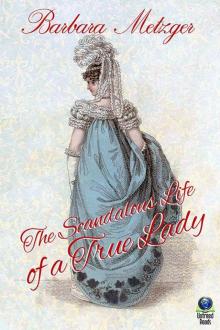 The Scandalous Life of a True Lady
The Scandalous Life of a True Lady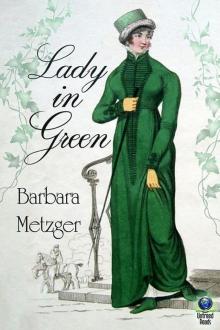 Lady in Green
Lady in Green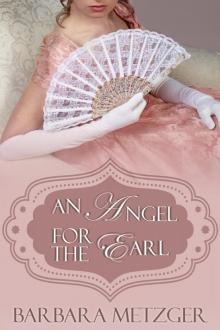 An Angel for the Earl
An Angel for the Earl Truly Yours
Truly Yours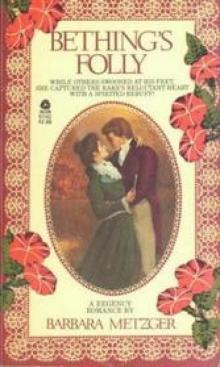 Bething's Folly
Bething's Folly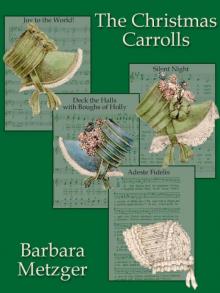 The Christmas Carrolls
The Christmas Carrolls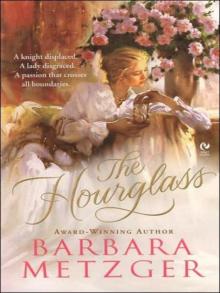 The Hourglass
The Hourglass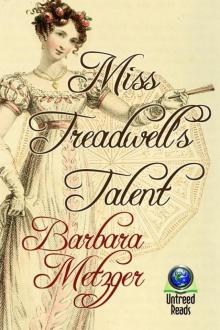 Miss Treadwell's Talent
Miss Treadwell's Talent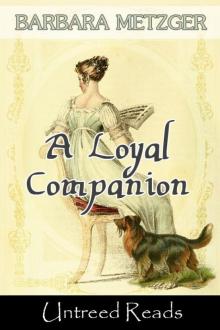 A Loyal Companion
A Loyal Companion Love, Louisa
Love, Louisa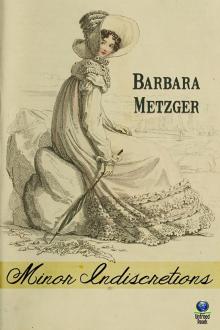 Minor Indiscretions
Minor Indiscretions Jack of Clubs
Jack of Clubs An Enchanted Christmas
An Enchanted Christmas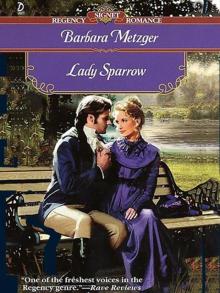 Lady Sparrow
Lady Sparrow Miss Westlake's Windfall
Miss Westlake's Windfall Autumn Glory and Other Stories
Autumn Glory and Other Stories Greetings of the Season and Other Stories
Greetings of the Season and Other Stories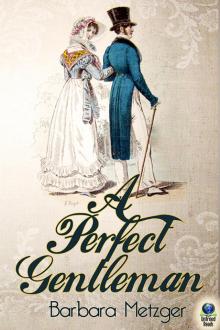 A Perfect Gentleman
A Perfect Gentleman